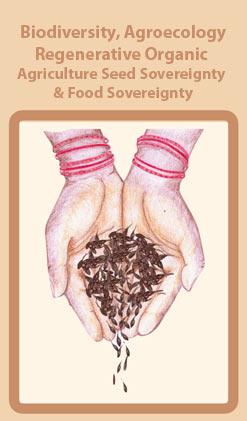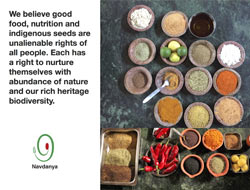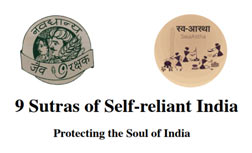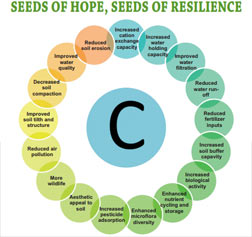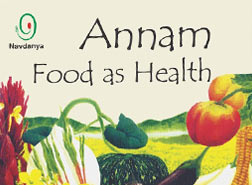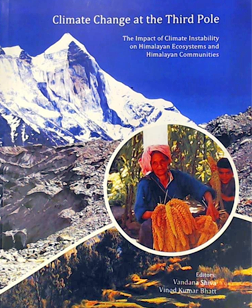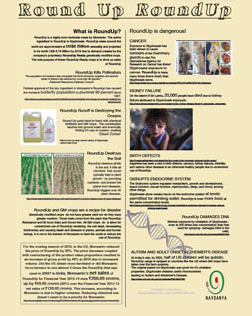More than 1,200 people took part in a Rally on tractor trolleys, jeeps, cars, buses and motorcycles from Daak Patthar Barrage on Yamuna river about 12 km away from the Charba village, in Doon Valley where Coca-Cola plans to set up its plant. Young and old, villagers and city dwellers became one in saying, “Coca-Cola is poison; it is wrecking havoc on our nation” , “In a country of milk and curd; Coke and Pepsi is absurd”, ”Coca-Cola, Pepsi Cola; leave India, leave India”, and “Your plan on our land, will not work, will not work”.
Coca Cola is planning to set up a plant in the village claiming it will bring water from the Yamuna river which is already facing a crisis due to a decline in water flow. The village has organised itself and passed a resolution with 100% consensus to not allow Coca cola to set up a plant on their village commons, which the government is trying to hand over to Coke.
Citizen's from across India and Doon Valley joined the the local community in solidarity. Charba Grameen Ekta Samiti, Friends of the Doon, Green Doon, MAD (Make a Difference) Himalaya Trust, Azadi Bachao Andolan, Nadi Bachao Aandolan, Citizens for Green Doon, People’s Science Institute, Chandrawati Samsthan, Lok Samiti Mehdiganj, SEAD, TARN, SPeED, URDC and others committed themselves to support local actions to prevent Coca Cola from destroying the land, the forests,and water in Western Doon.
The participants of the rally tied rakhis on trees that will be cut it the Coca cola plant is set up, in the tradition of the world famous Chipko movement of the 1970s which stooped logging in the central Himalaya in 1981.They also collected the sacred water of the Yamuna and took a pledge to protect their rivers and ground water.
Nandlal Master of Mehdi Ganj near Varanasi, shared the tragic experience of his community after Coca Cola set up a plant , extracting more than 2 million litres of water daily. The water level has declined dramatically, and the hand pumps and wells have gone dry. As in all other plants, the waste water has very high levels of heavy metals like Lead, cadmium, and Chromium. Initially, Coke tried to supply this polluted water for irrigation, but when the crops failed due to pollution, the farmers organised and refused to allow the company to deposit waste on their land. Now it dumps it in the Sacred Ganga. Nandalal also exposed the lie of employment for the local community.
Representatives of Charbba will visit Mehndiganj to learn firsthand the level of ecological and social devastation caused by Coca Cola.
It is because of these impacts the women of Plachimada, led by the late Mylamma, shut down the Coca Cola plant in Kerala. In Charbba, the community is determined to not let it start.
From Azadi Bachao Aandolan in Allahabad, Manoj Tyagi referred to the nationwide movement against Coca-Cola. Their fight continues for the last 15 years and now they also join Charba in the fight to keep the Doon Valley Coca-Cola free.
Dr Vandana Shiva gave the concluding speech at the rally, and reminded the citizens that 40 years ago the Women of Garhwal stopped logging in the Ganga Yamuna catchment to protect our water. 30 years ago in 1983, on the basis of the movement started by Friends of Doon and a study done for the Ministry of Environment by a team of scientists including Dr Shiva, the Supreme Court ordered the closure of limestone mines in Doon valley. Doon Valley was declared an ecosensitive zone in 1996, and all polluting industry was shut. Thirty years later Coca-Cola is violating the status of the Doon Valley as an eco-sensitive valley. As Coca Cola is a polluting industry, therefore has no place in ecologically sensitive Doon Valley. All citizens present committed themselves to stop Coca Cola's landgrab, water grab and pollution.
A decision was taken to continue strengthening the movement, to legally challenge the illegal actions of the government in signing the MoU with Coca-Cola, to start a massive aforestation drive as well as converting the Western Doon into a green and organic zone to realize the true meaning of the Doon Valley as an eco-sensitive zone.
The Charbba movement against Coca Cola will go down in history in the tradition of Chipko and the movement against mining.
The story begins on the 17th of April 2013 with the Government of Uttarakhand signing a Memorandum of Understanding (MoU) with Hindustan Coca-Cola Beverages Private Limited, allowing for the establishment of a 600 crore bottling plant on forty hectares of land in Charba village, Vikasnagar, Doon Valley. This land currently has more than 60,000 trees of different species such as Shisham, Kher, Bakkaiyan, and Sagwan, planted by Charba village members. After India’s independence there was a land donation movement (Bhoomi Daan) led by Vinobha Bhave, through which this land was given to the Gram Panchayat (village government) of Charba village, Vikasnagar, Uttarakhand. In 2006 Charba Gram Panchayat agreed to give this land for a university to be built with the condition that construction would begin within 2 years, if this fails to occur, the land will be returned to the village. This land now, without the knowledge or consent of the village, has been sanctioned for a bottling unit by the Government of Uttarakhand.
As per the MoU Coca-Cola plans to draw surface water from the river Yamuna to support its water needs and with this arises a number of issues, like : 1) is there enough water? The hydropower units currently in the area are facing water shortage. 2) In the monsoon season, although there is enough water but how they are going to resolve the serious issue of silt deposit and muddy water? 3)Daak Patthar barrage, from where the water will be drawn, is about 10 km from the planned site, it is unclear how the water is to be drawn to the village? Village is topographically higher than the Yamuna, which will definitely cause difficulties in the pumping the water.
The water level of the river Yamuna fluctuates on a seasonal basis, as does the discharge from the dam, a bottling plant will further affect this fluctuation and diminishes the water source of the canals connected downstream from the plant. So what will they use instead? The alternative to this fluctuation would be for the plant to revert to groundwater to fulfill its needs and this will directly affect the groundwater levels of surrounding areas. This would also deprive the villagers of their already depleting water resource, their tube wells, their hand pumps, wells. As evident from similar situations in Plachimada in Kerala and Mehdiganj in Banaras, Uttar Pradesh, all hand pumps within a five kilometer radius of the plant will be prohibited, further jeopardizing the water situation of the villagers, compelling them, especially women, to source their water from farther away. Furthermore, there has been no mention of a treatment facility to deal with the effluents from such a bottling unit from Coca-cola or the government.
From the experiences of Plachimada in Kerala, Kaladera in Rajasthan and Mehdiganj in Uttar Pradesh, where similar bottling units have been set up in the past, there have been drastic decline in water availability. The water table in Plachimada dropped from 40 feet to 125 feet, while well and hand pumps in neighboring areas went dry. Coca-Cola was mining 1.5 million liters of water per day creating water famine for the local communities. The women of Plachimada led by Mylamma started a Satyagraha against Coca-Cola and had the plant shut down. The local Gram Sabha cancelled its license and the high court of Kerala ruled that water does not belong to Coca-Cola nor does it belong to the State to give to Coca-Cola.
The plant in Mehandi Ganj near Varanasi on the banks of the Ganga has also been facing protests because of the depletion and pollution of ground water. Since the plant was setup in 1999 the water level has dropped by 40 feet, while hand pumps, wells, bore wells and ponds in the area have dried up and the government have banned new hand pumps and bore wells in a 5 km area around the plant. Recently Coca-Cola applied to the CGWA and the UPPCB to increase its groundwater usage from the current 50000 cubic meters annually to 250,000 cubic meter for the bottling plant in Mehandi Ganj. The villages are up in arms against Coca Cola stealing their water. Women have to travel five kilometers to obtain drinkable water, during which time soft drinks would come out of the Coca-Cola plant by the truckload. Furthermore, the Central Pollution Control Board of India found in 2003 that sludge from Coca-Cola’s Uttar Pradesh factory was contaminated with high levels of cadmium, lead and chromium.
We would like to give message to our Chief Minister that Government can't force something which is not accepted by the people. Today We all declare Doon Valley Free from Coke. We'll fight for our rights and will not allow any body to cut our forest for polluting the environment of Doon valley. In Solidarity.


